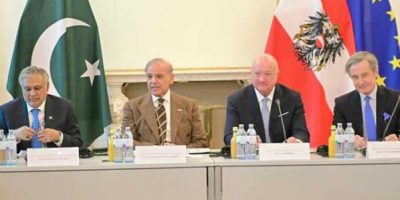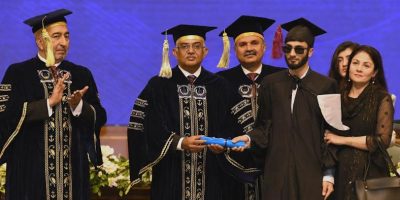KP draws flak for record-breaking 33-member cabinet with 12 special assistants

PESHAWAR: The Khyber Pakhtunkhwa government has set an new record by appointing 12 special assistants, expanding the cabinet to 33 members and placing a significant strain on the provincial exchequer.
The move has sparked controversy as it appears to conflict with the 18th Amendment of the Constitution. Legal experts argue that the appointments undermine the essence of the amendment, raising constitutional concerns.
Under the leadership of Chief Minister Ali Amin Gandapur, the Pakistan Tehreek-e-Insaf (PTI)-led KP government has formed a cabinet that includes 15 ministers, five advisers, and 12 special assistants.
According to Article 130(6) of the 18th Amendment, the size of the federal cabinet cannot exceed 11% of the total members of Parliament, and the same rule applies to the provincial cabinets.
The chief ministers, like the prime minister, cannot appoint more than five advisers. The issue of appointing special assistants has sparked debate across political and legal circles.
The size of the KP cabinet now exceeds 23% of the total assembly members from 11%, while Punjab’s cabinet size is only 5.6%, and Sindh’s cabinet size stands at around 20%.
A comparison of all four provincial governments reveals that KP tops the list with the appointment of 12 special assistants, followed by Sindh with 10 special assistants, Punjab with three, and Balochistan with none.
In Punjab, with 371 assembly members, the cabinet under Chief Minister Maryam Nawaz consists of one senior minister, 16 ministers, and 3 special assistants, making a total of 21 members.
In Sindh, with 168 assembly members, the cabinet under Chief Minister Murad Ali Shah includes 18 ministers, 5 advisers, and 10 special assistants, making a total of 34 members, along with eight spokespersons appointed by the chief minister.
In Balochistan, with 65 assembly members, the cabinet under CM Sarfraz Bugti includes 13 ministers and 4 advisers, making a total of 18 members, with no special assistants appointed.
In KP, with 145 assembly members, the cabinet under CM Gandapur comprises 15 ministers, 5 advisers, and 12 special assistants.
According to the Khyber Pakhtunkhwa Advisers and Special Assistants to the Chief Minister Amendment Act, 1989, the governor may appoint advisers and special assistants on the advice of the chief minister to assist him in performing his duties. These advisers and special assistants serve at the pleasure of the chief minister and are entitled to the remuneration and privileges determined by him.
A Finance Department official told The News that each minister, adviser, and special assistant receives a monthly salary and allowances totaling approximately Rs220,000 and Rs200,000 for house rent per month.
The cabinet ministers include Arshad Ayub Khan, Fazal Hakim Khan, Muhammad Adnan Qadri, Aqib Ullah Khan, Muhammad Sajjad, Meena Khan, Fazal Shakoor, Nazir Ahmad Abbasi, Pakhtoon Yar Khan, Aftab Alam Khan Afridi, Khaleeq Ur Rehman, Faisal Khan Tarakai, Muhammad Zahir Shah, Syed Qasim Ali Shah, and Syed Fakhar Jehan.
The advisers include Muzammil Aslam, Muhammad Ali Saif, Zahid Chanzeb, Ihtesham Ali, and Brig (retd) Muhammad Musaddiq Abbasi.
Abdul Karim Khan, Liaqat Ali Khan, Amjad Ali, Muhammad Sohail Afridi, Musavir Khan, Nek Muhammad Khan, Humayun Khan, Tufail Anjum, Rangez Ahmad, Tariq Mahmood Khan Saddozai, Shafqat Ayaz, and Muhammad Israr are the special assistants.
Prominent legal expert Shumail Butt, a former advocate general, declared the appointment of special assistants an abuse of the Constitution.
He said that the Parliament had set limits on the size of cabinets to reduce government expenses, but politicians have bypassed these limits by adopting alternative routes, which is against the spirit of the constitution.
He further said that provincial governments have made their own legislation to appoint special assistants, which is not permitted under the Constitution.
He said that the Supreme Court while upholding appointments of special assistants has opined that the discretion to appoint special assistants should be made structural and Parliament at an appropriate time should fix their eligibility and appointment criteria.
Another legal expert, Ali Gohar, questioned the participation of special assistants in cabinet meetings. He said that under Article 130(6) of the 18th Amendment, the size of the federal cabinet cannot exceed 11% of the total members of Parliament, and the same applies to provincial cabinets. Chief ministers, like the prime minister, cannot appoint more than five advisers.
Gohar added that chief ministers have exploited loopholes by appointing special assistants, which goes against the intention of constitutional amendments. He emphasised that the purpose of Parliament’s legislation was to reduce government expenditures and lessen the burden on the national treasury, but this objective has not been achieved.
While defending the special assistants, the Adviser to the Chief Minister on Information, Muhammad Saif said the KP government’s justification for the expanded cabinet is based on the need to effectively manage the province’s administrative affairs, particularly in light of its unique challenges.
The appointments were necessary to handle key portfolios and ensure better service delivery across various sectors. He argued that the chief minister has the power to appoint as many special assistants as needed, but they are not full cabinet members. Although they exercise the powers of ministers, they only attend cabinet meetings by special invitation.
Related News

Pakistan, Austria vow to boost bilateral ties in diverse fields
ISLAMABAD, FEB 16: Prime Minister Shehbaz Sharif on Monday said that Pakistan was working withRead More

Naval Chief confers degrees at Bahria University convocation
ISLAMABAD, FEB 16 /DNA/ – Bahria University, Islamabad, held its 28th Convocation Ceremony. Chief ofRead More


Comments are Closed